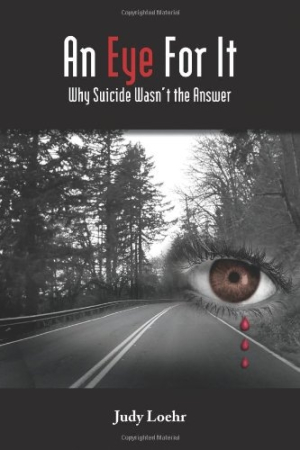An Eye For It
Why Suicide Wasn't the Answer
Loehr’s story is a heartening description of alcoholism and recovery, one that calls for a shift in public opinion about addicts and their families.
Trapped in a toxic marriage and suffering from alcoholism, Judy Loehr sought help from every corner. When her mental health worsened, she decided to end her life. Only when her suicide attempt failed did Loehr begin to build the life she deserved. An honest and brave memoir, An Eye For It: Why Suicide Wasn’t the Answer is an inspiring look at escape from alcohol addiction. Loehr’s life story is one of many too often not told that could help to change the way mainstream culture views alcoholism.
The predominant theme of this book is the effect of alcohol addiction on family. Loehr’s childhood is marked by the on-again, off-again presence of her alcoholic father, and she eventually marries a man who shares the affliction. The sheer pervasiveness of alcohol abuse in her social circle does much to put her own problem in context; since everyone around her drinks, it doesn’t seem all that odd that Loehr does, too. The fact that alcoholism is normal in her home environment makes her transition to recovery all the more inspiring. It is not necessary to have had contact with this destructive setting to be moved by Loehr’s situation.
Several other pervasive factors in Loehr’s life function as foils to her escape. Dane, Loehr’s husband, is particularly negative about her alcohol recovery, even after her first suicide attempt, and various aspects of the legal and medical systems also let her down repeatedly. What these inhibitors have in common is a status quo: Dane has a convenient housewife at stake, the divorce lawyer simply doesn’t take Loehr seriously, and the medical profession has little interest in the problems at the heart of her depression. Though the patterns in which she lives stifle her, Loehr’s ability to find an alternative community gives her the traction to free herself.
Nearly half of the book details the exhaustive lengths to which Loehr goes to build a perfect home and marriage. When she finally walks away from the security of her husband’s paycheck and her family’s wholesome image, the impact is as powerful as her suicide attempt. Her willingness to grow as a person endears, but her ability to take action inspires. Watching Loehr’s resolve develop from the ashes of her perfect life is as deeply motivational as her escape from addiction.
The book occasionally struggles with verb tense, alternating between past and present to describe events that have already happened. This is sometimes confusing, but it never interferes with the story. The writing style is otherwise straightforward. Though detailed regarding the author’s feelings and struggles, the book is well paced and never becomes slow. Some minor meandering over the last few chapters covers material not necessarily relevant to the theme, such as a vacation to Hawaii, but remains an interesting follow-up, a reassurance that Loehr has not only survived her hardships but has thrived.
An Eye For It is a genuine tribute to victory over the most impossible of odds: the quiet, everyday realities that bind people into unhappy patterns. This book will inspire recovering alcoholics and those who love them.
Reviewed by
Anna Call
Disclosure: This article is not an endorsement, but a review. The publisher of this book provided free copies of the book and paid a small fee to have their book reviewed by a professional reviewer. Foreword Reviews and Clarion Reviews make no guarantee that the publisher will receive a positive review. Foreword Magazine, Inc. is disclosing this in accordance with the Federal Trade Commission’s 16 CFR, Part 255.

